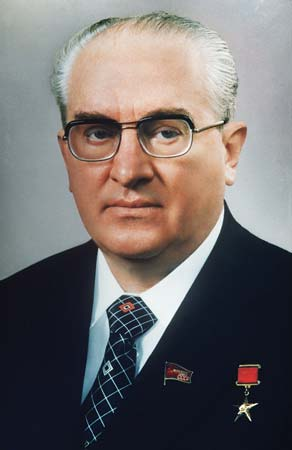(Created) Tag: Visual edit |
No edit summary Tag: Visual edit |
||
| Line 1: | Line 1: | ||
{{Infobox politician|name=Yuri Andropov|native_name=Юрий Андропов|birth_date=15 June 1914|birth_place=Nagutskaya, Stavropol Governorate, [[Russian Empire]]|death_date=9 February 1984|death_place=[[Moscow]], [[RSFSR]], [[Soviet Union]]|death_cause=Kidney failure|image=Andropov.png|image_size=200|political_line=[[Marxism–Leninism]]}} | {{Infobox politician|name=Yuri Andropov|native_name=Юрий Андропов|birth_date=15 June 1914|birth_place=Nagutskaya, Stavropol Governorate, [[Russian Empire]]|death_date=9 February 1984|death_place=[[Moscow]], [[RSFSR]], [[Soviet Union]]|death_cause=Kidney failure|image=Andropov.png|image_size=200|political_line=[[Marxism–Leninism]]}} | ||
'''Yuri Vladimirovich Andropov''' (15 June 1914 – 9 February 1984) was a Soviet politician who served as [[General Secretary of the Communist Party of the Soviet Union|General Secretary of the CPSU]] from | '''Yuri Vladimirovich Andropov''' (15 June 1914 – 9 February 1984) was a Soviet politician who served as Chairman of the [[Committee for State Security|KGB]] from 1967 to 1982 and [[General Secretary of the Communist Party of the Soviet Union|General Secretary of the CPSU]] from 1982 until his death in February 1984. | ||
== Early life == | == Early life == | ||
Andropov was born in Stavropol in 1914. He left school at age 16 and worked as a telegraph operator and a boatman on the Volga. He joined the [[Komsomol]] in 1936 and later became Second Secretary of the Komsomol of the [[Karelo-Finnish Soviet Socialist Republic|Karelo-Finnish SSR]] under First Secretary [[Otto Kuusinen]].<ref name=":0">{{Citation|author=Roger Keeran, Thomas Kenny|year=2010|title=Socialism Betrayed: Behind the Collapse of the Soviet Union|chapter=Two Trends in Soviet Politics|page= | Andropov was born in Stavropol in 1914. He left school at age 16 and worked as a telegraph operator and a boatman on the Volga. He joined the [[Komsomol]] in 1936 and later became Second Secretary of the Komsomol of the [[Karelo-Finnish Soviet Socialist Republic|Karelo-Finnish SSR]] under First Secretary [[Otto Kuusinen]].<ref name=":0">{{Citation|author=Roger Keeran, Thomas Kenny|year=2010|title=Socialism Betrayed: Behind the Collapse of the Soviet Union|chapter=Two Trends in Soviet Politics|page=48–56|pdf=https://ipfs.io/ipfs/bafykbzaceaj5ucph44bjwyhlhsbycckr3ts76zbucn2hbrea32tltcd4s5ekg?filename=Roger%20Keeran_%20Thomas%20Kenny%20-%20Socialism%20Betrayed_%20Behind%20the%20Collapse%20of%20the%20Soviet%20Union-iUniverse.com%20%282010%29.pdf|publisher=iUniverse.com|isbn=9781450241717}}</ref> | ||
== Political career == | == Political career == | ||
During the [[Great Patriotic War]], Andropov joined the Karelian partisan movement and fought against [[Fascism|fascist]] [[German Reich (1933–1945)|German]] invaders. He became the Second Secretary of the Communist Party of Karelia after the war and moved to Moscow to work for the [[Central Committee of the Communist Party of the Soviet Union|Central Committee]] in 1951. He became the Soviet ambassador to [[Hungarian People's Republic (1949–1989)|Hungary]] in 1954 and helped put down the [[Hungarian counterrevolution of 1956|1956 counterrevolution attempt]]. | During the [[Great Patriotic War]], Andropov joined the Karelian partisan movement and fought against [[Fascism|fascist]] [[German Reich (1933–1945)|German]] invaders. He became the Second Secretary of the Communist Party of Karelia after the war and moved to Moscow to work for the [[Central Committee of the Communist Party of the Soviet Union|Central Committee]] in 1951. He became the Soviet ambassador to [[Hungarian People's Republic (1949–1989)|Hungary]] in 1954 and helped put down the [[Hungarian counterrevolution of 1956|1956 counterrevolution attempt]]. | ||
In 1967, Andropov became Chairman of the | In 1967, Andropov became Chairman of the KGB, a post he held for 15 years. He dismissed corrupt party officials in [[Azerbaijan Soviet Socialist Republic (1936–1991)|Azerbaijan]] and even arrested General Secretary [[Leonid Brezhnev|Brezhnev]]'s daughter and son-in-law for black market activities.<ref name=":0" /> | ||
== General Secretary == | == General Secretary == | ||
Andropov became General Secretary in November 1982 after Brezhnev's death. In his first speech to the Central Committee, he called for modernization of production through computer technology. He launched a campaign to increase efficiency by targeting poor work quality, absenteeism, alcoholism, and irresponsibility. He abolished Brezhnev's policy of cadre stability and forced old, incompetent party members out of leadership positions. Andropov developed serious kidney problems three months into his term and died a year later.<ref name=":0" /> | |||
== References == | == References == | ||
[[Category:Politicians]] | [[Category:Politicians]] | ||
[[Category:Soviet politicians]] | [[Category:Soviet politicians]] | ||
Revision as of 15:31, 5 November 2022
Yuri Andropov Юрий Андропов | |
|---|---|
 | |
| Born | 15 June 1914 Nagutskaya, Stavropol Governorate, Russian Empire |
| Died | 9 February 1984 Moscow, RSFSR, Soviet Union |
| Cause of death | Kidney failure |
| Political orientation | Marxism–Leninism |
Yuri Vladimirovich Andropov (15 June 1914 – 9 February 1984) was a Soviet politician who served as Chairman of the KGB from 1967 to 1982 and General Secretary of the CPSU from 1982 until his death in February 1984.
Early life
Andropov was born in Stavropol in 1914. He left school at age 16 and worked as a telegraph operator and a boatman on the Volga. He joined the Komsomol in 1936 and later became Second Secretary of the Komsomol of the Karelo-Finnish SSR under First Secretary Otto Kuusinen.[1]
Political career
During the Great Patriotic War, Andropov joined the Karelian partisan movement and fought against fascist German invaders. He became the Second Secretary of the Communist Party of Karelia after the war and moved to Moscow to work for the Central Committee in 1951. He became the Soviet ambassador to Hungary in 1954 and helped put down the 1956 counterrevolution attempt.
In 1967, Andropov became Chairman of the KGB, a post he held for 15 years. He dismissed corrupt party officials in Azerbaijan and even arrested General Secretary Brezhnev's daughter and son-in-law for black market activities.[1]
General Secretary
Andropov became General Secretary in November 1982 after Brezhnev's death. In his first speech to the Central Committee, he called for modernization of production through computer technology. He launched a campaign to increase efficiency by targeting poor work quality, absenteeism, alcoholism, and irresponsibility. He abolished Brezhnev's policy of cadre stability and forced old, incompetent party members out of leadership positions. Andropov developed serious kidney problems three months into his term and died a year later.[1]
References
- ↑ 1.0 1.1 1.2 Roger Keeran, Thomas Kenny (2010). Socialism Betrayed: Behind the Collapse of the Soviet Union: 'Two Trends in Soviet Politics' (pp. 48–56). [PDF] iUniverse.com. ISBN 9781450241717